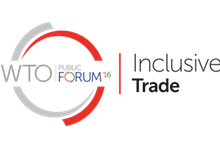Myanmar opening up for business: Agenda for inclusive trade
29 Sep 2016 10:30h - 12:00h
Event report
[Read more session reports and live updates from the 2016 WTO Public Forum.]
This session, organised by Myanmar, the Enhanced Integrated Framework (EIF), and the World Bank Group, focused on how to include Myanmar’s economy in international trade and generate inclusive economic growth for the people of Myanmar.
Than Myint, Minister for Commerce of Myanmar, opened the session by stating the objectives of 12 economic policies that were launched in Myanmar in July, and explaining how these policies generate an inclusive economic growth. He shared some concrete steps that Myanmar has taken towards integration in the global community, such as lifting economic sanctions from the US and EU, proposing a new investment law, and developing new strategies for trade with the assistance of the World Bank, the European Investment Fund (EIF) and the International Trade Centre (ITC). He also mentioned that Myanmar has benefited from international support, where the majority of supporters and donors have been working together with the ministers on trade related projects.
Sjamsu Rahardja, Senior Economist at the World Bank, presented Myanmar’s Diagnostic Trade Integration Study (DTIS), mentioning that poverty levels have decreased in recent years, but that the majority of those who are still poverty stricken have few resources and lack access to basic services such as education. National peace also plays an important role in trade since there are still some armed insurgent groups in certain regions. He praised the new government of Myanmar for their success with the newly reformed economy, and acknowledged their strong commitment to inclusive development.
Ratnakar Adhikari, Executive Director at the EIF, noted that a new national economy has just been launched and how DTIS can develop trade and cooperation for the government, which also emphasises the value of partnership. As Myanmar has encountered conflicts within the nation, he highlighted that armed conflicts restrain economic growth, and poverty can be reduced through trade and peace.
Win Win Tint, CEO of the CitiMart Group, discussed the transformation of the private sector in Myanmar, by giving an example of the CitiMart Group, which has created job opportunities within the nation and connected with 2000 domestic and international suppliers. Tint encouraged the government to have both short-term and long-term plans for economic growth.
Issues related to trade licensing, such as the long procedure of obtaining an export license, which restrain global trade development, were raised during the session. Myint explained that the government is trying to eliminate the unnecessary procedure of issuing export licenses and that new regulations on the export tax will be applied next year, which will lead to efficient trade development with foreign exporters.
At the end of the session, observers remarked that the Agenda for Inclusive Trade of Myanmar is a good model for Least Developed Countries (LDCs). It was also suggested that the World Bank could provide the same kind of support that it gave to Myanmar, to other LDCs.
by Aye Mya Nyein
Related topics
Related event

